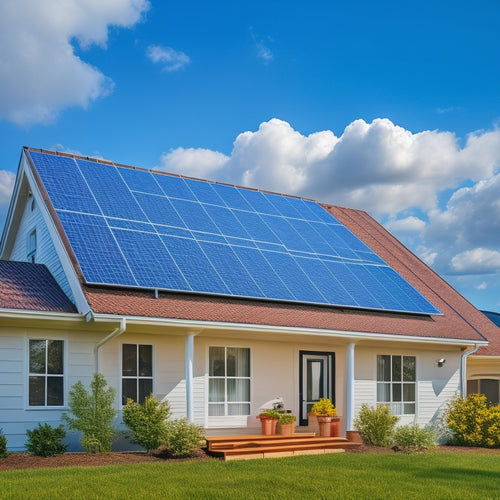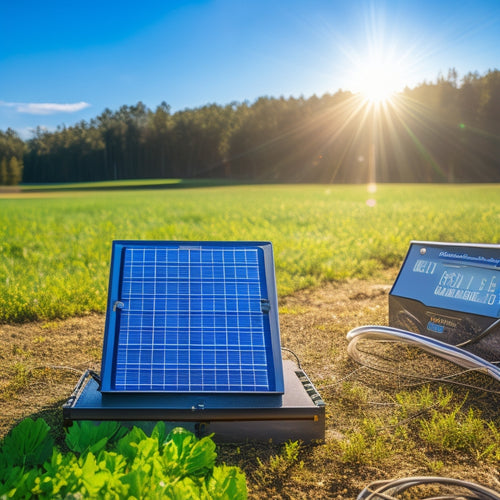
3 Essential Tips for Buying Solar Battery Backup Online
Share
When purchasing a solar battery backup online, you'll want to research thoroughly to make sure you get the right system. First, browse online marketplaces and manufacturers' websites to compare prices and specs. Next, evaluate technical specifications like system capacity, voltage, and compatibility to guarantee the system meets your energy needs. Finally, confirm compatibility with your existing setup and check warranties, certifications, and manufacturer support. By following these essential tips, you'll be well on your way to finding the perfect solar battery backup for your needs - and understanding the nuances of this complex process will help you make an informed decision.
Key Takeaways
• Research online marketplaces and manufacturers' websites to compare prices and specs of solar battery backup systems.
• Evaluate technical specifications, system performance, and compatibility with existing infrastructure before making a purchase.
• Ensure the system meets certification standards like UL and CE, and confirm warranty coverage, including minimum 5-year battery and 10-year inverter warranties.
• Validate compatibility with your existing setup, including battery type, voltage, and communication protocols.
• Read online reviews to gain insights from other customers who have purchased and used the solar battery backup system.
Researching Online Solar Battery Options
When shopping for a solar battery backup, kick off your search by browsing online marketplaces and manufacturers' websites to get a sense of the various options available and their corresponding price points. This initial research will give you a solid foundation for making an informed purchase decision.
As you explore these online resources, pay attention to online reviews from customers who've already invested in solar battery backups. Their firsthand experiences can provide valuable insights into the performance, durability, and reliability of different products.
Manufacturer websites are also an excellent source of information, offering detailed product specifications, warranty terms, and technical support details. You can also find certifications, such as UL (Underwriters Laboratories) or CE (Conformité Européene), which guarantee compliance with safety standards.
Evaluating Battery Backup Systems
You'll need to evaluate the technical specifications of each solar battery backup system to make sure it meets your energy needs and is compatible with your existing solar panel setup. This involves a depth analysis of the system's capacity, voltage, and compatibility with your existing infrastructure.
Don't just glance over the specs; take the time to understand how each system will perform in real-world scenarios.
System sizing is a critical aspect to take into account. You want a system that can handle your energy demands during periods of low sunlight or extended grid outages. Calculate your energy requirements and compare them to the system's capacity to make sure you're getting the right fit.
Consider factors like the number of batteries, total watt-hours, and maximum continuous discharge current.
Ensuring Compatibility and Warranty
Your solar battery backup system must seamlessly integrate with your existing solar panel array and other equipment, so confirm that the system's components are compatible with each other and your infrastructure. This includes validating that the battery type, voltage, and communication protocols align with your existing setup.
To guarantee compatibility, check the system's certification standards, such as UL and IEEE. These certifications ensure the system meets safety and performance standards.
| Certification | Description |
|---|---|
| UL (Underwriters Laboratories) | Ensures the system meets safety standards |
| IEEE (Institute of Electrical and Electronics Engineers) | Certifies the system meets performance and safety standards |
| CE (Conformité Européene) | Certifies the system meets EU health, safety, and environmental standards |
| ISO (International Organization for Standardization) | Certifies the system meets quality and environmental management standards |
Additionally, consider the manufacturer's support and warranty offered. A reputable manufacturer will provide thorough support, including installation assistance, maintenance guidance, and warranty coverage. Look for a minimum 5-year warranty on the battery and 10-year warranty on the inverter.
Frequently Asked Questions
Can I Install a Solar Battery Backup System Myself?
While it's tempting to DIY, you shouldn't install a solar battery backup system yourself, as it poses DIY safety risks and may violate local regulations, requiring professional expertise for a safe and compliant setup.
Will a Solar Battery Backup System Work During a Grid Outage?
"When in doubt, prepare for the worst, and hope for the best." In a grid outage, you'll be glad you invested in a solar battery backup system, ensuring grid reliability and power autonomy, so you can keep the lights on, no matter what.
How Long Does It Take to Charge a Solar Battery Backup System?
When you're wondering how long it takes to charge your solar battery backup system, consider the charge time, which depends on factors like your system's power capacity and the amount of sunlight available.
Can I Use a Solar Battery Backup System With a Generator?
You're considering pairing a solar battery backup system with a generator. Take, for instance, a rural off-grid cabin, where a hybrid system combines solar energy storage and a backup generator, ensuring uninterrupted power supply during extended grid outages.
Are Solar Battery Backup Systems Environmentally Friendly?
You're wondering if solar battery backup systems are environmentally friendly. Yes, they are! By harnessing renewable energy, you'll reduce your eco footprint and carbon offset, making a significant step towards a sustainable future.
Related Posts
-

Is Switching to Green Energy Solutions Easy
Switching to green energy solutions isn't just easy; it's also beneficial. You can greatly cut utility costs and enjo...
-

Cost of Solar Panel Installation
You can expect to pay between $15,000 and $30,000 or more for a typical solar panel installation, depending on the sy...
-

Choosing the Right Solar Power Charge Controller
Choosing the right solar power charge controller is crucial for maximizing energy efficiency and extending battery li...


